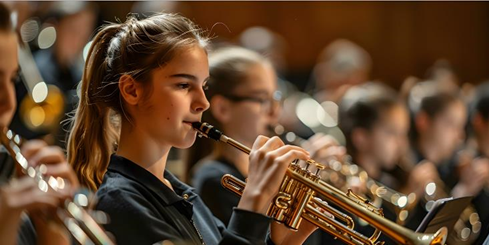
Music Education Is Important!
Share
In the realm of education, the role of music cannot be overstated. Research indicates that students engaged in music education demonstrate improved cognitive abilities, enhanced social skills, and increased emotional intelligence. According to a study published in the Journal of Educational Psychology, students involved in music programs score, on average, 20% higher on standardized tests compared to their peers who do not participate in such programs.
Golden Music’s commitment extends beyond merely providing high-quality musical instruments. We recognize the profound impact that music education has on students, schools, and communities. By facilitating access to musical instruments, we aim to foster an environment where creativity and collaboration thrive. Studies show that schools with robust music programs report a 50% higher retention rate among students, highlighting the importance of music in maintaining student engagement.
Furthermore, music education has been linked to improved discipline and time management skills. A survey conducted by the National Association for Music Education found that 75% of music students reported better organizational skills, which are essential for academic success. This correlation underscores the value of integrating music into the educational curriculum.
Establishing a band or orchestra program in a school setting can be a daunting task for teachers and administrators who are already managing numerous responsibilities. However, with the right approach and resources, it is possible to create a successful program that enriches students' educational experiences and fosters a love for music.
First, it is essential to assess the interest level among students. Surveys can be distributed to gauge the number of students interested in participating in a band or orchestra. Research indicates that programs with a minimum of 20-30 interested students are more likely to succeed, as this provides a sufficient pool for forming ensembles.
Our approach includes providing flexible rent-to-own payment options, which significantly reduce financial barriers for families and schools. This initiative allows students to access quality instruments without the burden of upfront costs, thereby promoting inclusivity in music education. The ability to rent instruments can lead to a 30% increase in student participation in music programs, as families are more likely to engage when financial constraints are alleviated.
Moreover, we offer comprehensive maintenance plans to ensure that instruments remain in optimal condition. Regular maintenance not only prolongs the life of the instruments but also enhances the learning experience for students. Research indicates that well-maintained instruments can improve sound quality by up to 40%, which is crucial for developing musicianship.
Additionally, recruiting qualified instructors is vital. Experienced music educators can provide the necessary guidance and instruction to students. It is advisable to seek out individuals with a background in music education and performance. Research shows that programs led by qualified instructors have a higher retention rate, with up to 85% of students continuing their musical education year after year.
Once the program is established, it is important to create a structured curriculum that aligns with educational standards. The National Core Arts Standards provide a framework for music education, emphasizing the importance of creating, performing, responding, and connecting to music. Implementing a curriculum that adheres to these standards can enhance the program's credibility and effectiveness.
In conclusion, our commitment to making a difference for students, schools, and communities is rooted in the understanding that music education plays a vital role in holistic development. By providing access to quality instruments and support, we aim to empower the next generation of musicians and contribute positively to their educational journeys. The benefits of music education extend far beyond the classroom, fostering skills that students will carry with them throughout their lives.
